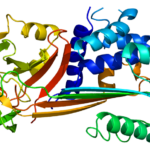Could restoring insulin sensitivity help reduce symptoms of depression in people with treatment-resistant bipolar disorder? Judging from the results of a small, proof-of-concept clinical trial conducted at the University of Pittsburgh and Dalhousie University in Nova Scotia, Canada, it certainly appears so.

Dr. Roy Chengappa
The findings, published this month in the Journal of Clinical Psychiatry, show that patients whose insulin sensitivity was restored either by medication or by a change in lifestyle had a marked improvement in the severity of their depression and anxiety, which had been constant fixtures of those patients’ lives for over 25 years.
“It is hard to shift the needle in the treatment prognosis of bipolar disorder patients who have failed eight different medications on average and have more than 20 years of illness behind them,” said coauthor Dr. Roy Chengappa, professor of psychiatry at Pitt. “The degree of change in depression and anxiety in patients who have regained insulin sensitivity in our trial is a major improvement.”
The medical community is becoming increasingly more aware that patients with bipolar disorder are predisposed to diabetes, and that diabetes can, in turn, make patients’ bipolar episodes worse. Those individuals are particularly vulnerable to Type II diabetes, an impairment in the way that the body regulates blood glucose levels, either as a result of insufficient production of the glucose-lowering hormone insulin or because of decreased sensitivity to insulin.
Rates of Type II diabetes in patients with bipolar disorder are three times higher than those in the general population, and a large portion of patients with diagnosed bipolar disorder are prediabetic and have reduced insulin sensitivity while their blood glucose level remains normal.
Insulin resistance, or reduced insulin sensitivity, is a serious risk factor for worse mental health outcomes in bipolar disorder patients and can make patients less responsive to conventional medications. But despite these grim statistics, psychiatric clinics seldom order tests for insulin resistance – which are relatively straightforward and cheap – and treating established diabetes does not appear to be enough to improve patients’ psychiatric outcomes.
To see if treating insulin resistance would improve treatment-resistant bipolar depression, researchers designed a proof-of-concept clinical trial. The trial included 45 middle-aged participants who failed eight or nine psychiatric drug treatment trials. The vast majority of patients had a chronic course of illness with no periods of remission for over 25 years. By trial design, approximately half of the patients received regular doses of metformin – a cheap and readily available insulin sensitizing drug – while remaining on their regular medication regime, and the other half received placebo.

Dr. Jessica Gannon
As early as six weeks after metformin treatment was initiated, the researchers saw promising changes. By 14 weeks, half of the patients in the metformin group became insulin-sensitive and their depression and anxiety subsided drastically. Better yet, the improvements in depression, anxiety and general functioning were sustained up to 26 weeks.
“Given that the only other therapy that works comparably well is electroconvulsive therapy – a procedure that involves applying electrical current to the patient’s brain, causing a controlled seizure — achieving the same result just by restoring insulin sensitivity seems astounding,” said coauthor Dr. Jessica Gannon, associate professor of psychiatry at Pitt.
Although the study still needs to be replicated across a larger patient population, it shows that addressing insulin resistance can be a powerful tool in improving clinical outcomes in patients with bipolar disorder and that testing patients for insulin resistance needs to be more widespread.
“The field of psychiatry has been slow to latch on to the idea that metabolic changes elsewhere in the body can affect the brain in profound ways,” said lead author Dr. Cynthia Calkin, associate professor of psychiatry and medical neuroscience at Dalhousie University. “Yet, our work suggests that this direction is worth pursuing. It’s a brand-new way of treating our sickest patients, based on underlying mechanisms related to brain dysfunction. Really, this is the birth of a new field, that of metabolic psychiatry.”









